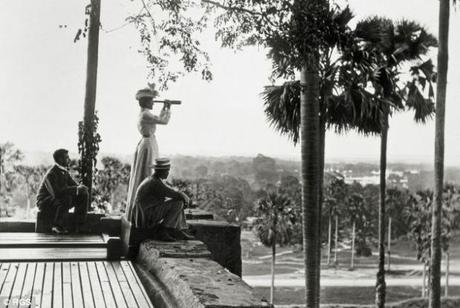
It’s always rather galling when you come across a book that’s exactly the sort of thing you wish you had written yourself. Victorian people who enjoy learning about all of the scientific advances of their age, and spend their time collecting botanical specimens and traveling to exotic, uncivilised climes are definitely Victorian people I want to spend time with, and Gilbert’s huge, sweeping and incredibly ambitious novel certainly had me wishing this was a research project I’d had my teeth stuck into. A fictional tale with enough reference to non fiction to make it feel like I was reading about a living, breathing person, it tells the story of Alma Whittaker, born in Philadelphia in 1820 to a wealthy English botanical importer and his intensely practical, phenomenally intelligent Dutch wife Beatrice. Her father being one of the richest men in America, Alma grows up surrounded by wealth and luxury, but she is no pampered miss. Her mother’s love of intellect and reason ensures that Alma grows up with the most excellent of educations, and she is fluent in several languages, conversant in all of the latest scientific theories, and an expert in botany before she even reaches two figures. For a child who loves nothing more than books and the natural world, Alma’s life could not be more perfect. That is until one night a tragedy occurs on the family estate, and a beautiful little orphaned girl, exactly Alma’s age, suddenly becomes her sister when her parents decide to take her in.
Alma and Prudence, brought up by the emotionally cold Beatrice, their minds focused solely on developing knowledge and reason, have no understanding of how to become sisters, or to make friends. Despite being the daughters of a colossally wealthy man, they are not considered a good catch due to their odd ways, and their world becomes increasingly closeted as they reach marriageable age. Alma, sexually awakened thanks to the discovery of a pornographic book in her father’s library, quivers with sexual desire and longs to marry, but her plainness and terrifying intellect have created a formidable barrier to such emotional fulfilment. She watches as her unfathomable, seemingly emotionless sister inexplicably marries their former tutor, and then her only friend marries the man she has loved from afar for some years, leaving her alone and responsible for the running of her father’s business after the sudden death of her mother. However, Alma, ever rational, does not fall into despair at this disappointment; suppressing her sexuality, she devotes herself to her botanical work, determining on becoming the world’s foremost expert on mosses. She achieves much success at this, and derives great pleasure from it, but when love comes to her once again, much later in life, she finds that suddenly all else pales in comparison, and her emotions will lead her to travel paths she could never have otherwise imagined in the pursuit of trying to understand that most unanswerable of natural mysteries: the vagaries of the human heart.
The Signature of All Things is a fascinating, enormously wide ranging novel, taking in all manner of topics, from natural history to slavery, to the position of women and colonialisation. It is an incredibly ambitious attempt to encompass the nineteenth century spirit, and while it is by no means perfect, and could have done with a little more editing, it is a fantastic story with some brilliant characters, and looks at the nineteenth century from a far different perspective to any other historical novel I’ve read. Alma is a wonderful central force whose struggle to find a place for herself in a world that has not given her what her heart desires is incredibly moving but also very inspiring, and she leaps to life from the pages. I have to say that initially I had low expectations, considering that I had only known Gilbert’s name from her Eat, Pray, Love fame, but she is far more than just a new-age memoir writer, and I would recommend this to anyone who wants to be entirely transported elsewhere for a few days. I was quite bereft when I finished, and have a list as long as my arm of places and people and topics I now want to research – nineteenth century female botanists are about to become my new obsession!
Advertisements